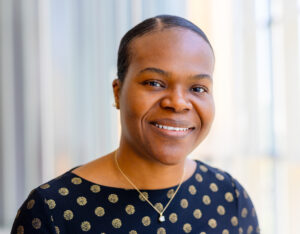In an effort to improve diversity in the biomedical research workforce, the Graduate Research Training Initiative for Student Enhancement, also known as G-RISE, supports PhD students across multiple disciplines including biophysics, engineering and neuroscience.
G-RISE is led by director Dr. Ruth Stark and co-director Dr. Reza Khayat, both from the Department of Chemistry and Biochemistry.
The three-year program, funded by the National Institutes of Health (NIH), allows students to focus solely on their research.
“What [G-RISE] offered was a freedom to not do all these extra things that come with doing the PhD, such as teaching classes, and rather just focusing 100% of your time on research,” Dr. Nana Agyemang said. He is the first student to graduate from the G-RISE program.
Agyemang explains that when he first began working towards a PhD, he felt burdened by the multiple elements. He had just started a family and was doing research, with the added stress of studying, reading and teaching classes. He stresses that having the ability to focus solely on research is an underappreciated freedom.

Dr. Nana Agyemeng
Working with Dr. Mark R. Biscoe at the Center for Discovery and Innovation, Agyemang’s research focused on new ways to make carbon-carbon bonds in chiral molecules. These are molecules that have a non-superimposable mirror image, meaning that the mirror image of the molecule is not identical and cannot be matched up properly.
Along with focusing on research, G-RISE offered mentoring. The students practiced two-minute elevator pitches and had to explain their research to scientists and nonscientists.
When Agyemang was interviewing for jobs, the program helped him elaborate on himself and his research and taught him how to communicate with everyone in the room.
Another student of G-RISE, Rachele Rameau, who plans to graduate in Fall 2024, appreciates the network that exists in the program. She adds that sometimes working toward your PhD can be isolating, but with G-RISE she was able to connect with students in different fields.
“It’s supportive, like a network of scientists that you can relate to,” Rameau said.
Starting her journey with G-RISE during the beginning of the pandemic, Rameau said it was frustrating not being able to go into the lab, but students still got bi-weekly meetings with faculty who were supportive and motivated them to go back when the lab was open.

Rachele Rameau
Rameau’s current research in Dr. Karen Hubard’s lab is focused on evaluating the role of ruthenium iminophosphorane (Ru-IM) in altering epigenetic mechanisms in triple negative breast cancer, a very aggressive cancer with limited options for treatment. The ultimate goal of her work is to understand possible and differential mechanisms of action of Ru-IM. This work is done in collaboration with Dr. Maria Contel, a chemist from Brooklyn College, who developed the Ru-IM compound. Along with Dr. Karen Hubbard, Rameau recently contributed to a publication on the American Chemical Society journal.
After completing her PhD, Rameau has hopes of being a professor and continuing to do research that aims to alleviate disease.
Unlike Rameau, Agyemang went on to work in industry at AstraZeneca in the Boston area. He works on small molecule, early oncology development.
Reflecting on G-RISE, Agyemang wishes the program would incorporate more industry-based conferences and talks. Due to most of G-RISE being a program that aims to attract minority serving backgrounds, Agyemang believes that most students tend to lean toward industry instead of academia because it is more financially rewarding.
“At that time in your career, you’re thinking about the next step, and to most people, the next step is either get a job or do postdoctoral work,” Agyemang said.

Malina Seenarine is a recent graduate of Baruch College where she studied journalism and minored in theater. In addition to writing for The RICC, she’s a contributor for Baruch’s award-winning Dollars & Sense Magazine and wrote for the arts and news section of Baruch’s student-run newspaper, The Ticker. She’s also written for FSR magazine.